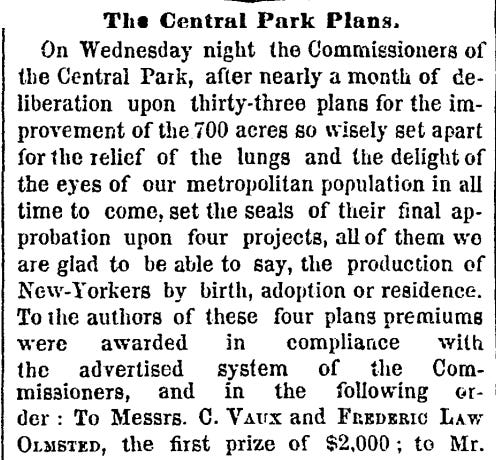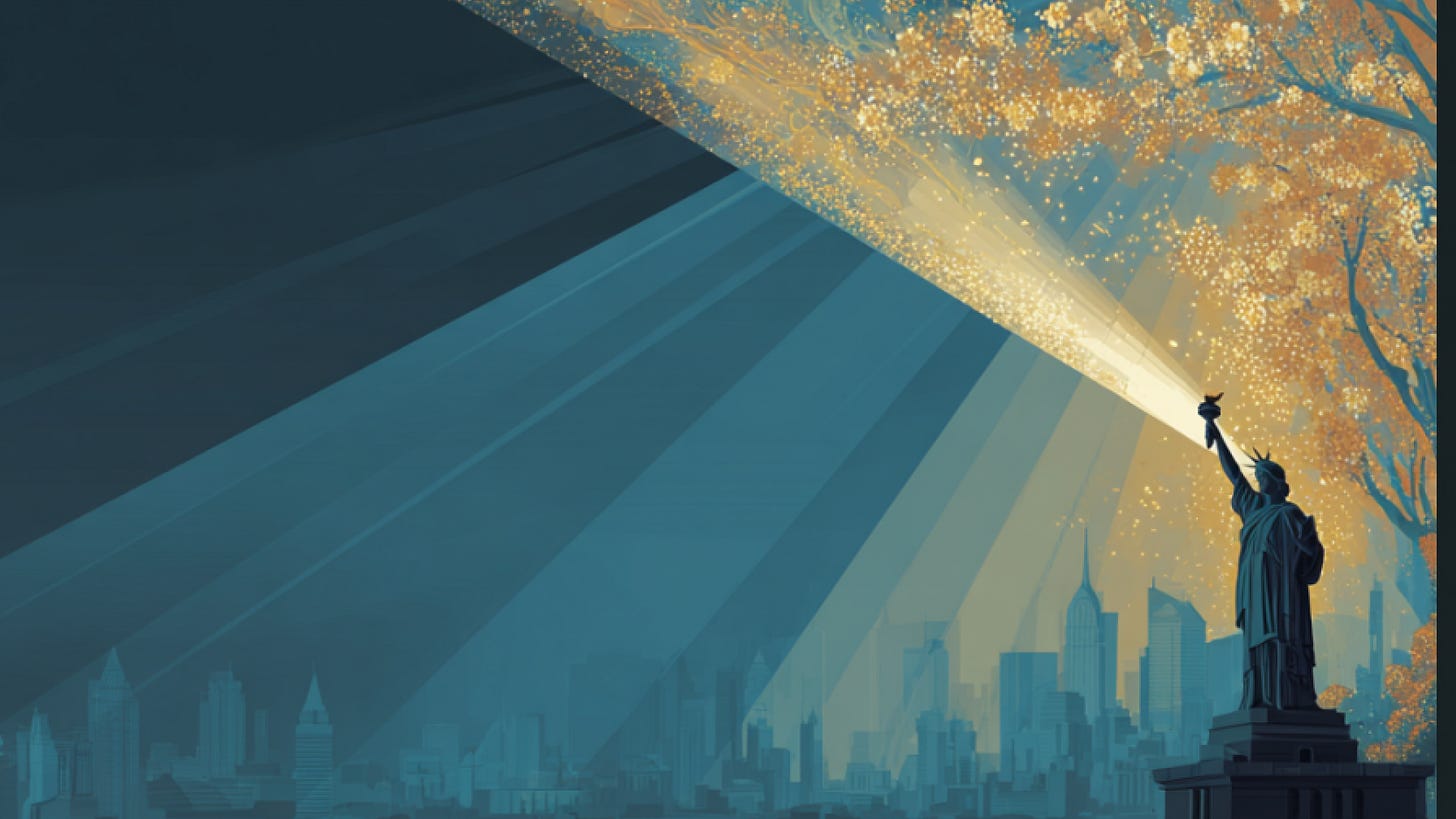Prize Culture and Civic Economy: The Method of the Roosevelt-Riis Association
This essay outlines one principal activity, prizemaking, of the new Roosevelt-Riis Association, which formally launches next month. Tom Laurino-Hanson and I are co-founders.
Prize culture: a culture broadly characterized by individuals and small groups awarding prizes for the production of public, civic, or cultural goods.
The Roosevelt-Riis Association’s concept of “prize culture” is a distinct descendant of “patronage culture,” through which the government and the very wealthy have historically incentivized such work through commissions. Our aim is to deepen the markets for such efforts, expanding liquidity, accelerating timelines, and broadening the universe of potential competition sponsors and entrants.
New York’s history is filled with prizes—a positive incentive to produce some finished product. Central Park’s design came from a prize competition that awarded $2,000 (1858 dollars) to Frederick Law Olmsted and Calvert Vaux for their “Greensward” plan. Then as now, prizes for the production of public, civic, or cultural goods typically came from either the state, corporate entities, or the very wealthy.
One of the Roosevelt-Riis Association’s principal goals is to foster a broad-based culture of prizemaking by enabling individuals to directly engage in it, particularly with their friends. This goal stems from three contentions:
The RRA recognizes that prizemaking’s norms are still largely anchored in larger, more formal entities that give prizes away on a slower cadence, to fewer people, with slower iteration.
The RRA recognizes that New York City’s population has over 1 million people who earn $100k a year, and that our city and nation have tremendous, broad-based wealth. The RRA believes that with the establishment of basic foundational norms and social scaffolding, a meaningful portion of these individuals (but not just these individuals) would be excited to participate in a dynamic, decentralized, highly generative culture of prizemaking—a civic economy.
The RRA recognizes that among the 8.5 million residents of New York are people with just about any type of skill one could imagine. The RRA believes that many of these talented New Yorkers would be excited to deploy their skills in the civic economy if given the opportunity to do so.
To accelerate the creation of this “civic economy,” the Roosevelt-Riis Association will sponsor and organize a system of prizes and bounties related to the RRA’s mission of cultivating active citizenship in support of growth, efficiency, and order in New York City.
Beginning immediately upon its launch next month, it will promote a series of prizes, including standing open competitions and new monthly competitions dropping every month. The RRA Prize Program will generally award prizes of $500-$1,000 at minimum, which will be paid out quickly after prize evaluation—only for the prize slate to be renewed in short order with more opportunities!
Prizes will be put up for the production of writing, video, music, citizen science, events, civic design, industrial photography, physical statuary and 3D printing, and much more. The RRA will set a new cadence for prizemaking, and, through its membership, propagate the norms and soft skills necessary to cultivate a broad-based culture of individual prizemakers.
New York is perfectly positioned for this new prize culture.
There are many individuals walking around the city right now who would not blink (or even notice, in some cases) if one or a few thousand dollars suddenly disappeared from their bank account. That money is absolutely theirs to do with as they please! But the RRA believes they can have a very pleasurable time using some portion of it for prizes that produce positive cultural externalities alongside their personal enjoyment. Imagine a group of five friends getting together and each throwing $4k into a common pot; that’s $20k. What could you get for a prize of that magnitude? A new musical? A new documentary? A statue? A book? A work of art? A small lab to conduct surveys around city infrastructure? It is hard to make a finite list without narrowing the reader’s conception of what can be done, especially considering what technological developments make possible. The limit is mostly our collective imagination, which is precisely why we seek so strenuously to broaden the markets for this type of civic and cultural production.
Now imagine tens of thousands of people were doing this kind of thing, to degrees greater and lesser than $20k, as a regular, casual use of money. A group that is able to structure social norms and status gradients to achieve this cultural transformation would number among the greatest of our city’s historical benefactors, along with the many prizemakers who joined them in the endeavor.
This is what The Roosevelt-Riis Association aims at. The RRA will be a market maker in this new civic economy, and in doing so will spread the social norms and social technology needed for other individuals and groups to begin their own prizemaking efforts.
If successful, the RRA Prize Program will generate a transformational increase in voluntary value exchange for mutual benefit, with massive positive externalities. It represents an expansion of civic markets, making them broader, deeper, and more liquid. Not everything on offer today is all that there could be, and clearly NYC has the talent to produce far more for our civic and cultural spheres than it currently does. The RRA will increase supply by making demand legible through prizes, and will match those with means to those with skills and knowledge. This was the exact beneficial nature of Theodore Roosevelt’s great friendship with Jacob Riis.
Want to know more? Want to help us know more? Want to help RRA fund its prize pool? Want to be a founding member of RRA?
DM me here on Substack.
Email me at daniel@maximumnewyork.com.
Sign up for the Roosevelt-Riis Associations newsletter, which will carry our monthly prize slates and more.
Thank you to Tom Laurino-Hanson, co-founder of the Roosevelt-Riis Association, for comments on this essay.




Looking forward to seeing what comes of this!